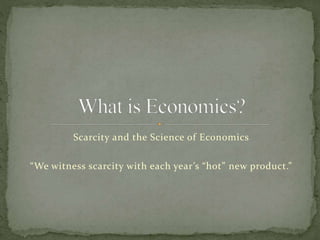
Whatiseconomicsunit1week1 110919142126-phpapp01
- 1. Scarcity and the Science of Economics “We witness scarcity with each year’s “hot” new product.”
- 2. Fundamental Economic Problem Scarcity: Condition where unlimited human wants face limited resources. Effects almost every decision we make.
- 3. The study of how people try to satisfy wants with scarce resources. Economics is about scarce resources, consumption and production. How many "economic elements" can you identify in the picture above?
- 4. Need: Required for survival. •Want: Desired for satisfaction.
- 5. Because resources are limited, virtually everything we do has a cost. Someone has to pay for production “TINSTAAFL” Why do you think scarcity is an issue with the rich as well as the poor?
- 6. What To Produce: A society must choose based on its needs. How To Produce: Society must choose based on its resources. For Whom to Produce: Society must choose based on its population and other available markets.
- 7. Land: Limited natural resources not created by humans (climate, fresh water, vegetation, minerals, animals) Capital: Means by which something is produced (money, tools, equipment, machinery, and factories).
- 8. Labor: Workers who apply their efforts, abilities, and skills to production. Entrepreneur: Risk-takers who combine the land, labor, and capital into new products.
- 9. When all the factors of production are present, PRODUCTION, or the process of creating goods and services, takes place.
- 10. Economists offer an explanation of the economy and its activities to the society’s population. Prediction: We want to know what’s around the corner to better prepare ourselves for the unknown. Will prices rise or fall? Will income increase or decrease? Economics is a social science because it looks at the decisions people make and how they react to those decisions.
- 11. Basic Economic Concepts “20% of the world’s people who live in the wealthiest nations consume 86% of the world’s goods and services. The 20% who live in the poorest nations consume only 1.3%”
- 12. Goods: Item that is economically useful or satisfies an economic want. Consumer good: Intended for final use by individuals Capital goods: Manufactured goods which are used to produce other goods and services. Ex.? Durable goods: Any product that lasts longer than 3 years when used on a regular basis. Ex? Nondurable goods: Any product that lasts less than 3 years when used on a regular basis. Ex?
- 13. Services:Work that is performed for someone and intangible. Consumers: A Person who uses goods and services to satisfy wants and needs. Why do you think the U.S. has been described as a “society of consumption”?
- 14. Value: A worth that can be expressed in dollars and cents. Scarcity by itself is not enough to create value. For something to have value, it must also have utility.
- 15. Utility: Provide satisfaction, which varies with the needs and wants of each person.
- 16. The accumulation of goods that are tangible, scarce, useful, and transferable from one person to another. A nation’s wealth is comprised of all items, including natural resources, factories, etc. Does not include services!!
- 17. The Market Factor Markets Individual’s earned income Focus on the four factors of production: land, labor, capital, entrepreneurship Product Markets Individual’s spending place Focus on goods and services
- 19. Productivity Measure of the amount of output produced by a given amount of input within a certain time Productivity increases with efficient use of scarce resources.
- 20. Economic Growth: Depends on high productivity An economy’s productivity may be affected by…
- 21. Economic Interdependence We rely on others, and others rely on us, to provide the goods and services that we consume.
- 22. Opportunity Cost The cost of the next best alternative among a person’s choices. The cost may be the money, time or resources a person gives up, or sacrifices, to make his/her final choice. Discussion Question: What are some important economic decisions you will be facing within the next 5 weeks? 5 months? One year? Five years?
- 23. Production Possibilities continued Opportunity Costs: Expressed in terms of trade-offs, or in terms of things given up to get something else Economic Growth: Any increase in resources and/or productivity causes the production possibilities frontier to move outward
- 24. Build simple models to analyze or describe actual economic situations. Employ Cost-Benefit Analysis: Compare the cost of an action to the benefits received (Ex. ?) Baby Steps: Make decisions by taking small, incremental steps toward the final goal
- 25. Studying economics will help us know how the economy works on a daily basis. Helps us understand the Free Enterprise economy where consumers and privately owned businesses, not the government, make a majority of the economic decisions.
- 26. Helps us become better decision-makers, both in our personal and professional lives AND at the voting booth!!
- 27. Every time a choice is made, something is given up! Rational choice is taking the things with greater value and giving up those with lesser value On an individual level, the choices are not so difficult… On the societal level, the choices may not be so easy to make…